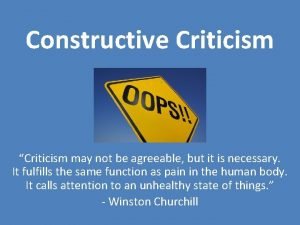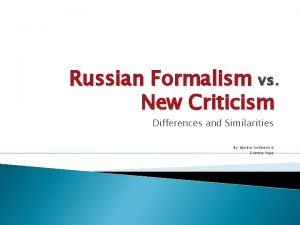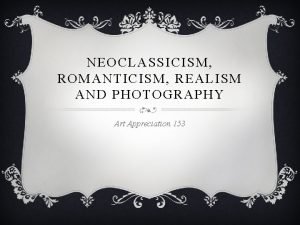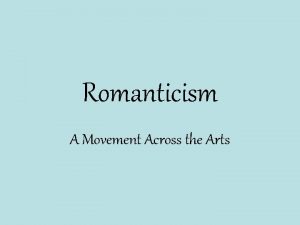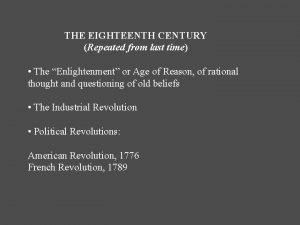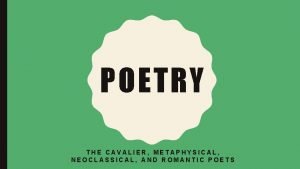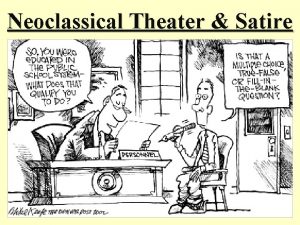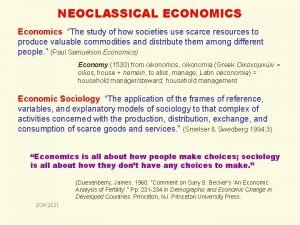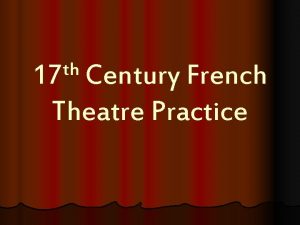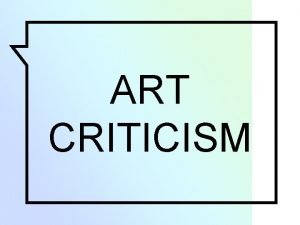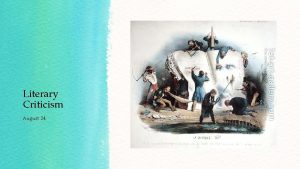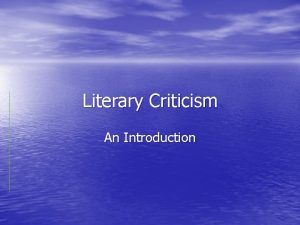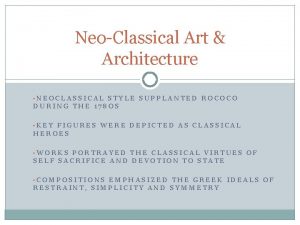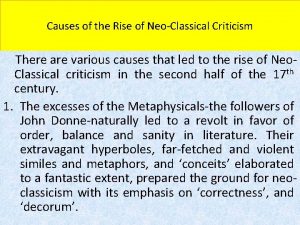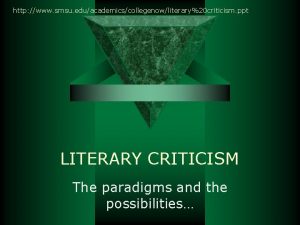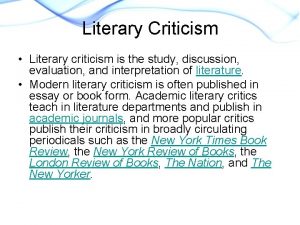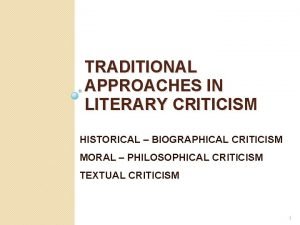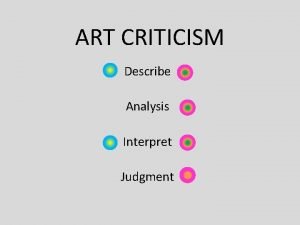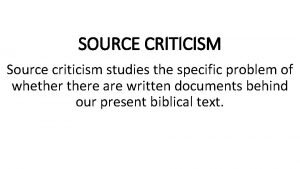NEOCLASSICAL Criticism The Neoclassical Movement It is the

























- Slides: 25

NEO-CLASSICAL Criticism

The Neoclassical Movement It is the name that is given to the Western movement in the decorative, visual arts, theatre, music, and architecture that draws inspiration from the "classical" art and culture of Ancient Greece or Ancient Rome. The main Neoclassical movement coincided with the 18 th century Age of Enlightenment, and continued into the early 19 th century, latterly competing with Romanticism.

Neoclassical Movement Renaissance till 1798 (18 th Century) Essay on Criticism first appeared in 1711, but was written in 1709

Neo-Classical Movement Neoclassical Simply, it is the movement of art that is inspired by the ancient Greek and Roman Arts.

Neoclassical Movement in English Literature It is divided into three parts: § The Restoration Age (1660 -1700) § The Augustan Age (1700 -1750) § The Age of Johnson (1750 -1798) Importantly, in the light of Essay on Criticism by Pope, the Augustan Age way of thinking clarifies the Age of Enlightenment and Neoclassical Movement in England.

Alexander Pope : is a translator, poet, wit, and satirist. He is a sharppenned satirist of public figures and their behavior. To read his work is to be exposed to the order and wit of the 18 th century poetry. Pope primarily used the heroic couplet, and his lines are immensely quotable. “To err is human; to forgive, divine, ”.

General View of Essay on Criticism: Essay on Criticism is influenced mainly by Aristotle and Horace. The tone is straight-forward and conversational. It is a discussion of what good critics should do and should not do.

General View on Essay on Criticism: Essay on Criticism concepts and ideas fall into three classifications : 1. An Introduction. 2. Faulty Judgment. 3. Ideal Criticism.

1 - An Introduction : 1. Pope contends in the poem's opening couplets that bad criticism does greater harm than bad writing particularly poetry. 2. Pope notes the lack of “true taste” in critics. 3. Pope advocates knowing one’s own artistic limits. 4. He stresses the order in nature and the value of the work of the “Ancients” of Greece, but also states that not all good work can be explained by rules.

1 - An Introduction : 5. Throughout the poem, Pope refers to ancient writers such as Virgil, Homer, and Aristotle. 6. The "Imitation of the ancients" is the ultimate standard for taste. 7. Pope indicated in his poem that poets are made, not born, and that criticism, like poetry, needs talent.

The causes of faulty judgment: 1 - Pride: Some critics are too proud; so they cannot see the truth and this affects their judgment. 2 - A little learning is a dang'rous thing. Some critics only learn a little bit. They harm themselves and others.

The causes of faulty judgment: 3 -Reading a work of art with the same spirit the author wrote it. A perfect judge will read each work of with the same spirit that its author writ : Survey the whole, nor seek slight faults to find where nature moves , and rapture warms the mind ; Nor lose, for that malignant dull delight, the gen'rous pleasure to be charm'd with wit.

The causes of faulty judgment: A. Survey the whole. B. Some critics concentrate on parts – confine to conceit. C. Others on expressed language (style). D. Some follow the fashion in judging. E. Others judge by number of words or rhythm not by what is said (idea) like the people who go to church for music not instruction.

The causes of faulty judgment: 4 - Avoid extremes: Avoid Extreams; and shun the Fault of such, Who still are pleas'd too little, or too much. At ev'ry Trifle scorn to take Offence, That always shows Great Pride, or Little Sense; Those Heads as Stomachs are not sure the best Which nauseate all, and nothing can digest.

The causes of faulty judgment: 5 - Some critics like the ancients, some like the foreign (French) and some prefer only the moderns (English): Some foreign Writers, some our own despise; The Ancients only, or the Moderns prize: Some critics only appreciate writers from a certain group or a certain style or a certain country. There are some critics who only value the works of the ancients and other critics only value the works of the moderns. If the writer does not belong to the group, the critic believes himself superior, he does not appreciate his work.

The causes of faulty judgment: 6 - Some ne'er advance a Judgment of their own, But catch the spreading Notion of the Town; They reason and conclude by Precedent, And own stale Nonsense which they ne'er invent. Some critics solely depend on the writer’s reputation. Critics have to judge a work not according to the person’s reputation but according to

The causes of faulty judgment: 7 - Some judge of Authors' Names, not Works, and then Nor praise nor blame the Writings, but the Men. Of all this Servile Herd the worst is He That in proud Dulness joins with Quality, A constant Critick at the Great-man's Board, To fetch and carry Nonsense for my Lord.

The causes of faulty judgment: 8 -Vulgar not singular. The Vulgar thus through Imitation err; As oft the Learn'd by being Singular; So much they scorn the Crowd, that if the Throng By Chance go right, they purposely go wrong; Some critics make the fault of following what other people say about a writer whether it is the writer’s reputation or it is a popular opinion (according to the status and social condition of a writer).

The causes of faulty judgment: 9 -Some praise those who follow them and make themselves the measure of mankind. Some praise at Morning what they blame at Night; But always think the last Opinion right.

IDEAL CRITICISM Alexander Pope gives pieces of advice for the critic to have certain qualities.

Ideal criticism The first advice: is to befriend and merit §. Be thou the first true Merit to befriend; His Praise is lost, who stays till All commend; Short is the Date, alas, of Modern Rhymes; And 'tis but just to let 'em live betimes.

PRIDE, MALICE, FOLLY, AGAINST DRYDEN ROSE, IN VARIOUS SHAPES OF PARSONS, CRITICKS , BEAUS; BUT SENSE SURVIV'D, WHEN MERRY JESTS WERE PAST; FOR RISING MERIT WILL BUOY UP AT LAST ;

IDEAL CRITICISM The third advice: to prise a good nature & good sense. Nor in the Critick let the Man be lost! Good-Nature and Good-Sense must ever join; To err is Humane; to Forgive, Divine.

IDEAL CRITICISM The fourth advice: be reserved for works of extreme provocation. Discharge that Rage on more Provoking Crimes, Nor fear a Dearth in these Flagitious Times.

 Neoclassical age
Neoclassical age Descriptive criticism vs prescriptive criticism
Descriptive criticism vs prescriptive criticism Biblical criticism is not a form of historical criticism.
Biblical criticism is not a form of historical criticism. Constructive criticism vs destructive criticism
Constructive criticism vs destructive criticism New criticism lens
New criticism lens Movement vs non movement area
Movement vs non movement area Axial movements examples with pictures
Axial movements examples with pictures Neoclassical economics
Neoclassical economics Neoclassical (1750–1850)
Neoclassical (1750–1850) Romanticism vs neoclassicism art
Romanticism vs neoclassicism art Enlightenment vs romanticism
Enlightenment vs romanticism Neo classical characteristics
Neo classical characteristics Classical school of thought
Classical school of thought Marat artist
Marat artist Difference between classical theory and neoclassical theory
Difference between classical theory and neoclassical theory David oath of the horatii neoclassicism
David oath of the horatii neoclassicism Neoclassical growth theory vs. endogenous growth theory
Neoclassical growth theory vs. endogenous growth theory The apotheosis of homer
The apotheosis of homer Neoclassicism
Neoclassicism Metaphysical poetry
Metaphysical poetry Neoclassical poets
Neoclassical poets Medieval literature timeline
Medieval literature timeline Neoclassical satire
Neoclassical satire Neoclassical vs romanticism
Neoclassical vs romanticism Neoclassical economics
Neoclassical economics Clitandre commedia dell'arte
Clitandre commedia dell'arte



